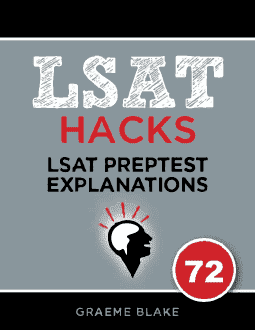QUESTION TEXT: The older a country is, the more likely it is to be…
QUESTION TYPE: Parallel Reasoning
CONCLUSION: New country (most) ➞ monarch
REASONING: Country (most) ➞ monarch
Older countries are more likely to be ruled by monarchs.
ANALYSIS: Note: “likely” is a synonym for “most” on the LSAT. Same goes for usually, tends to, probably, etc.
This is a good argument. We know any given country is unlikely to be ruled by a monarch, since most countries are not ruled by monarchs. So we could already say that a new country is unlikely to be ruled by a monarch (because this is true for any country).
Then the argument makes this even more certain by saying that new countries are even less likely to be ruled by monarchs. We already knew that countries in general are unlikely to be ruled by monarch, so making a set of countries less likely to be ruled by monarchs strengthens this conclusion.
To match this structure, we should have a conclusion that’s already true for the group as a whole, and then make that conclusion even more true for a subset by saying that subset is even more likely to match the conclusion.
The answers all have the same subject matter: novels and movies. The wrong answers tend to switch terms. In the stimulus, the evidence and conclusion were all statements about countries. In the wrong answers, the statements often switch from novels to movies.
___________
- This is wrong because the evidence is about what’s likely for a novel, but the conclusion is about what’s likely for a movie.
- This answer switches from talking about novels, to talking about movies, then back to novels.
- This has two differences. First, the second sentence should have said “the less popular a novel is, the less likely it will be made into a movie”. And the conclusion should have been that therefore unpopular novels are probably not made into movies.
In other words, this answer should have been phrased like answer D. - CORRECT. This matches. Every statement is about novels. We already know a novel is unlikely to be made into a movie, because most aren’t. The conclusion is about a subset of novels: unpopular ones. We know these are even less likely to be made into movies, so it’s especially true that they’re unlikely to be made into movies.
- This conclusion is a sort of incorrect reversal. We know that novels with simple plots are more likely to be made into movies. But that doesn’t mean they’re likely to be made into movies. Maybe they only have a 2% chance, while most novels have an even lower chance, 1%.


It’s kind of funny how B, C, and E can be eliminated on the basis of a superficial comparison.
The stimulus’ “general statement” that helps the argument says: Countries most /Monarch
And the conclusion says: New Countries most /Monarch.
The latter parts match!
In B, C, and E, the corresponding statements’ latter parts do not match:
B: … not made into moves -> made into a movie
C: … not made into movies -> made into movies
E: … not made into movies -> (probably) not made into a movie.
I wonder if considering only superficial features is a safe strategy for these questions.